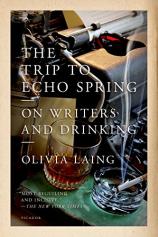The Trip to Echo Spring: On Writers and Drinking
Review
The Trip to Echo Spring: On Writers and Drinking
Olivia Laing takes a unique approach to literary biography. Her debut, TO THE RIVER, explored the life of Virginia Woolf by following the route of the English river in which the famous novelist drowned herself. Now, in her second work of literary biography, Laing takes a similar approach as she traces the lives and works of six American authors of the 20th century, all of whom were heavy drinkers.
Laing's subjects are F. Scott Fitzgerald, Ernest Hemingway, Tennessee Williams, short story writers John Cheever and Raymond Carver, and the poet John Berryman. Why she chose these six writers rather than the scores of others (including several women) who fall under the category of authors/alcoholics is both strategic and personal. Some of these authors, most obviously Fitzgerald and Hemingway, are connected either personally or professionally --- they taught at the same universities, lived in the same cities, and/or wrote about each other's work.
"Whether or not readers are familiar with the work of the authors Laing explores here, THE TRIP TO ECHO SPRING is worth taking, not only as an example of a creative approach to biography, but also as a moving work in its own right."
The title of Laing's book, THE TRIP TO ECHO SPRING, is an allusion to Williams's play Cat on a Hot Tin Roof, but it’s also a subtle nod to the kind of work she undertakes here. As she explores the role that alcohol --- and heavy alcohol use --- played in these writers' lives, she is literally traveling to some of the notable spots in their lives and, as she puts it, attempting to "build a kind of topographical map of alcoholism, tracing its developing contours from the pleasures of intoxication through to the grueling realities of the drying-out process."
Laing's journey takes her from New York to the South, Midwest and Pacific Northwest. Along the way, she visits Williams's New Orleans; Key West, which played a significant role in Williams's and Hemingway's lives; St. Paul, instrumental in the lives of Fitzgerald and Berryman; and finally across the Plains to Port Angeles, Washington, the site of Carver's eventual recovery from alcoholism.
Laing, who is British, takes most of her journey by train, and some of her observations of this country and its inhabitants will strike American readers as the obvious musings of an outside observer, a tourist. But Laing is no stranger to the lives of these writers, whose work she also knows well and summarizes effectively for the reader; nor is she a stranger to alcoholism, as she reveals gradually throughout her narrative. Laing's childhood was marked by family trouble with alcohol abuse; the ways in which she interweaves her personal history with those of these authors makes for powerful and, in the end, redemptive reading.
Laing relies not only on the authors' works to inform her writing; she also includes commentary on the changing medical and social understanding of alcoholism over time, as well as the success of programs such as Alcoholics Anonymous, which itself views alcoholism and recovery as a journey of sorts. And amid her discussions of science and literature (and revelations about her own life), Laing's writing can be lyrical and powerful, as in this passage about alcohol's destructiveness for the writer: "You begin with alchemy, hard labour, and end by letting some grandiose degenerate, some awful aspect of yourself, take up residence at the hearth, the central fire, where they set to ripping out the heart of the work you've yet to finish."
Whether or not readers are familiar with the work of the authors Laing explores here, THE TRIP TO ECHO SPRING is worth taking, not only as an example of a creative approach to biography, but also as a moving work in its own right.
Reviewed by Norah Piehl on January 8, 2014
The Trip to Echo Spring: On Writers and Drinking
- Publication Date: October 28, 2014
- Genres: Literary Criticism, Nonfiction, Writing
- Paperback: 384 pages
- Publisher: Picador
- ISBN-10: 1250063736
- ISBN-13: 9781250063731





